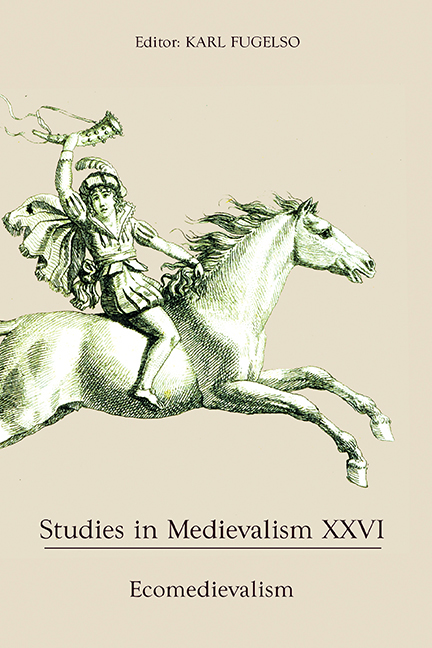Book contents
- Frontmatter
- Studies in Medievalism
- Acknowledgments
- Contents
- List of Illustrations
- Editorial Note
- I Ecomedievalism: Some Perspective(s)
- II Interpretations
- Fragmentary Dreams: John Aubrey's Medieval Heritage Construction
- Charter Horns and the Antiquarian Imagination in Early Modern England
- Giving Voice to Griselda: Radical Reimaginings of a Medieval Tale
- Medieval and Futuristic Hells: The Influence of Dante on Ellison's “I Have No Mouth and I Must Scream”
- Reading Westeros: George R. R. Martin's Multi-Layered Medievalisms
- Modernity in the Middle: The Medieval Fantasy of (Coopted) Feminism in Disney's Maleficent
- Future Medieval: (Neo)Medievalism in Babylon 5 and Crusade
- Cosmopolitan Anxieties and National Identity in the Netflix Marco Polo
- Mapping Everealm: Space, Time, and Medieval Fictions in The Quest
- Medievalisms of the Mind: Undergraduate Perceptions of the “Medieval” and the “Middle Ages”
- Mask of the Medieval Corpse: Prosopopoeia and Corpsepaint in Mayhem's De Mysteriis Dom Sathanas
- Contributors
- Miscellaneous Endmatter
Reading Westeros: George R. R. Martin's Multi-Layered Medievalisms
from II - Interpretations
Published online by Cambridge University Press: 15 September 2017
- Frontmatter
- Studies in Medievalism
- Acknowledgments
- Contents
- List of Illustrations
- Editorial Note
- I Ecomedievalism: Some Perspective(s)
- II Interpretations
- Fragmentary Dreams: John Aubrey's Medieval Heritage Construction
- Charter Horns and the Antiquarian Imagination in Early Modern England
- Giving Voice to Griselda: Radical Reimaginings of a Medieval Tale
- Medieval and Futuristic Hells: The Influence of Dante on Ellison's “I Have No Mouth and I Must Scream”
- Reading Westeros: George R. R. Martin's Multi-Layered Medievalisms
- Modernity in the Middle: The Medieval Fantasy of (Coopted) Feminism in Disney's Maleficent
- Future Medieval: (Neo)Medievalism in Babylon 5 and Crusade
- Cosmopolitan Anxieties and National Identity in the Netflix Marco Polo
- Mapping Everealm: Space, Time, and Medieval Fictions in The Quest
- Medievalisms of the Mind: Undergraduate Perceptions of the “Medieval” and the “Middle Ages”
- Mask of the Medieval Corpse: Prosopopoeia and Corpsepaint in Mayhem's De Mysteriis Dom Sathanas
- Contributors
- Miscellaneous Endmatter
Summary
Hans Robert Jauss defines modernity as “the self-understanding of our era from the past.” For scholars of medievalism, modernity typically refers to “the contemporary perspective from which a medievalist writer ponders, and attempts to create, a fictional Middle Ages.” Most assume that medievalism is “a modern invention.” However, in his preface to the 1996 edition of Studies in Medievalism, Leslie Workman defines it as “the continuing process of creating the Middle Ages.” Even some medieval writers, including Chrétien de Troyes, the Pearl poet, and Sir Thomas Malory, created a fictional Middle Ages as a method of self-understanding the contemporary concerns of their era. In the Jaussian sense, these writers of Arthurian romance might themselves be considered to write from “modern” perspectives, and their literary creations, as Nicholas Haydock points out, could be considered medievalism (or medievalistics, in Haydock's terminology). In other words, medievalism is not necessarily a post-medieval construct. Rather, it is a process of engaging with a fictionalized medieval past, and this process is possible not only within recent medievalist texts, but also within texts from the Middle Ages. In A Song of Ice and Fire, George R. R. Martin embraces the narrative strategies of Arthurian romance writers, particularly Chrétien, the Pearl poet, and Malory, complicating our notions that medievalist narrative is dramatically different from medieval narrative. In his creation of a complex, multi-layered world, Martin vividly illustrates how both modern and medieval populations might create a medieval past for self-understanding.
According to Tom Shippey, “no literary work of medievalism can avoid some interaction with modernity.” Medievalist texts, either intentionally or not, reflect the contemporary concerns of their authors, but so do some medieval texts. The romance writers noted above intentionally drew upon pre-existing legends to create a fictionalized past that served to illustrate their contemporary concerns.
- Type
- Chapter
- Information
- Studies in Medievalism XXVIEcomedievalism, pp. 131 - 142Publisher: Boydell & BrewerPrint publication year: 2017

